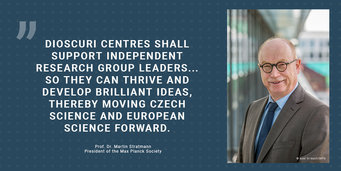Dioscuri goes Czech Republic
Up to five Dioscuri Centres to be established in the next few years
In a virtual signing ceremony on 2 September 2021, Max Planck Society’s President Martin Stratmann and Robert Plaga, the Czech Minister of Education, Youth and Sports (MEYS), signed a ‘Memorandum of Cooperation’. They will jointly manage a person-centered funding scheme that will support up to five Dioscuri Centres of Scientific Excellence at Czech host institutions. Funding for these Centres is provided in equal parts by the German Federal Ministry of Education and Research (BMBF) and the MEYS. The Czech Republic is the second country in which the Dioscuri Programme, which was launched in Poland in 2018, is being implemented.

Anja Karliczek, Federal Minister of Education and Research, Germany, stressed the importance of the novel funding program – both for the Czech Republic as well as for the European Research Area as a whole: "I am very pleased that the Max Planck Society's Dioscuri Programme will now also provide excellent conditions and a long-term perspective for early-career researchers and scientific talents in the Czech Republic. It opens the door for them to collaborate with other top researchers in Europe and around the world. The Dioscuri Programme strengthens the European Research Area in an exemplary way." In his welcoming speech, the Czech Minister of Education, Youth and Sports, Robert Plaga, addressed the close and deep-rooted political and scientific relations between the Czech Republic and Germany and the anticipated effects of establishing Dioscuri Centres in his country: “The implementation of the Dioscuri Programme in the Czech Republic carries a great potential to be an essential milestone for Czech science to become more advanced, forward-looking and superb in its outcomes.”

the Czech Republic and Prof. Joachim Sauer, Chair of the Dioscuri Committee.
Max Planck President Martin Stratmann explained the benefits that come with the internationally competitive package the Dioscuri Programme has to offer: “Dioscuri Centres shall function not only as lighthouses of scientific excellence and contribute to the research output of the Czech Republic. They shall also serve as examples for supporting independent research group leaders as efficiently and as comprehensively as possible: by offering them great infrastructure and generous funding; by paying internationally competitive salaries; by welcoming them and their diverse teams at the host institutions; by providing them with all the administrative help they might need and making things possible for them – so they can thrive and develop brilliant ideas, thereby moving Czech science and European science forward.”
Next steps
A total of up to five Dioscuri Centres are to be established in the Czech Republic in the coming years. They will be funded in equal parts by the BMBF and the Czech Ministry of Education, Sports and Youth (MEYS) with a total of 300,000 euros per year (analogous to Poland). Two cross-disciplinary rounds of calls are planned, alternating annually with the calls in Poland and overseen by the esteemed Dioscuri Committee. The calls are open to early-career researchers from all scientific disciplines and regardless of their country of origin or current employment. The first call for Dioscuri Centres in the Czech Republic is scheduled to be published in December 2021 – up to three centres may be selected for funding. The first centres are expected to open in the second half of 2023, followed by a second call for proposals in 2024.
Update (23.11.2021): From mid-December to the beginning of March, the Ministry of Education, Youth and Sports (MEYS) will invite Czech research organizations to register as potential host institutions for the first call for Dioscuri Centres of Scientific Excellence in the Czech Republic. Any public research organization that is willing to establish, host and accommodate a Dioscuri Centre (DC) under the call conditions, may register as a potential host institution. All eligible registrations will be included in a ‘List of Potential Host Institutions’ within the first call for Dioscuri Centres in the Czech Republic, scheduled to be published on March 31st, 2022. During the registration period, webinars will be offered to inform interested research organizations about the program and the application process.
PM













